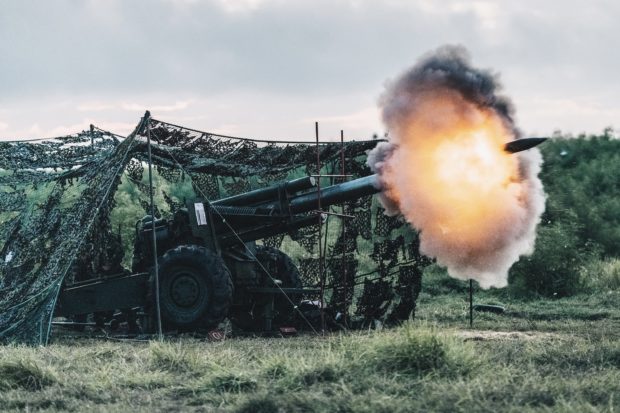
This Taiwans Ministry of National Defense handout picture taken and released on August 24, 2022 shows a US-made 155mm howitzer firing during a drill at Penghu islands. AFP
TAIPEI — Taiwan announced plans for a record increase to its defence budget on Thursday after huge military drills by China earlier this month sent tensions between the two to their highest in decades.
Taipei has proposed a defence budget of Tw$415.1 billion ($13.7 billion) for next year, up 13 percent year-on-year, pending parliamentary approval.
An additional special budget will also be created specifically to acquire new fighter jets and other projects to boost naval and air capabilities, the top budgeting agency said in a statement.
“To protect national security, the overall defence budget for next year will reach Tw$586.3 billion to a record high,” a cabinet spokesman quoted Premier Su Tseng-chang as saying.
Taiwan lives under constant threat of invasion by China, which claims the democratic island as part of its territory to be seized one day — by force if necessary.
Beijing’s sabre-rattling has grown more pronounced under President Xi Jinping, China’s most assertive leader in a generation.
The bolstered military budget was unveiled after Beijing staged unprecedented exercises around Taiwan in retaliation for US House Speaker Nancy Pelosi’s visit to Taipei earlier this month.
Beijing lashes out at any diplomatic action that might lend Taiwan legitimacy and has responded with growing anger to visits by Western officials and politicians.
For a week after Pelosi’s visit, China sent warships, missiles and fighter jets into the waters and skies around Taiwan, its largest and most aggressive exercises since the mid-1990s.
Even before this month’s drills, Beijing had increased military pressure on Taiwan in recent years, particularly with incursions into the island’s air defence identification zone (ADIZ).
Last year, Taiwan recorded incursions by around 970 Chinese warplanes into its air defence zone, according to a database compiled by AFP, more than double the roughly 380 in 2020.
The figure this year already exceeded 980, with more than 360 incursions being recorded in August alone.
The increased activity puts further stress on Taiwan’s outgunned military resources, especially its ageing fleet of fighter jets.
“There have been significant increases in operation maintainance in response to the cross-strait situation, as our aircraft and naval ships have been (increasingly) deployed,” budgeting chief Chu Tzer-ming told reporters.
Historically, Taiwan’s military has favoured big-ticket purchases like fighter jets and warships.
But American and Taiwanese strategists have increasingly pushed Taipei to adopt a “porcupine” strategy of asymmetric warfare.
That strategy emphasises purchasing comparatively inexpensive and mobile weapon systems, like anti-ship and aircraft missiles, as well as training soldiers and civilian reservists to fight behind enemy lines to make an invasion a grim prospect even for China’s huge military.
RELATED STORIES
Taiwan opposition politician takes war games concerns to China
China’s Taiwan drills accompanied by wave of misinformation
China extends military drills around Taiwan after Pelosi visit
Pelosi says US cannot allow China to isolate Taiwan